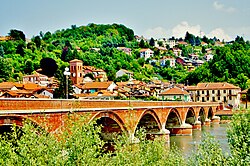San Mauro Torinese
| San Mauro Torinese | ||
|---|---|---|
| Comune | ||
| Comune di San Mauro Torinese | ||
 |
||
|
||
| Location of San Mauro Torinese in Italy | ||
| Coordinates: 45°06′N 07°46′E / 45.100°N 7.767°E | ||
| Country | Italy | |
| Region | Piemont | |
| Province / Metropolitan city | Turin (TO) | |
| Frazioni | Oltre Po, Cascina del Mulino, Pescarito, Pescatori, Sambuy, Sant'Anna | |
| Government | ||
| • Mayor | Marco Bongiovanni | |
| Area | ||
| • Total | 12 km2 (5 sq mi) | |
| Elevation | 211 m (692 ft) | |
| Population (2011) | ||
| • Total | 18,925 | |
| • Density | 1,600/km2 (4,100/sq mi) | |
| Demonym(s) | Sanmauresi | |
| Time zone | CET (UTC+1) | |
| • Summer (DST) | CEST (UTC+2) | |
| Postal code | 10099 | |
| Dialing code | 011 | |
| Patron saint | St. Peter | |
| Saint day | April 7 | |
| Website | Official website | |
San Mauro Torinese is an Italian comune in the Metropolitan City of Turin in the Piemont region. It is bordered by the territories of Settimo Torinese, Castiglione Torinese, Turin, and Baldissero Torinese.
The first written record of Pulchra Rada (the ancient name for San Mauro, which in Latin means "beautiful beach and/or port" - on the Po river) dates from 4 May 991. On that day Anselmo (at the time the ruler of Montferrat) gave the order to rebuild the a Benedictine monastery, erected originally above a pre-existing ancient Roman settlement, that had been destroyed by a Saracen invasion.
The abbey became especially prosperous in the 12th century, after which it started to decline due to the continuous strife between the bordering Marquisate of Montferrat and Duchy of Savoy. In 1474 it was therefore suppressed and turned into in commendam. The way was owned by the Benedictinese until 1603, when it was transferred to secular clergy. The convent was suppressed again by Pope Pius VI in 1803.
The large bridge connecting San Mauro to Bertolla on the other side of the Po River was inaugurated in 1912.
...
Wikipedia


